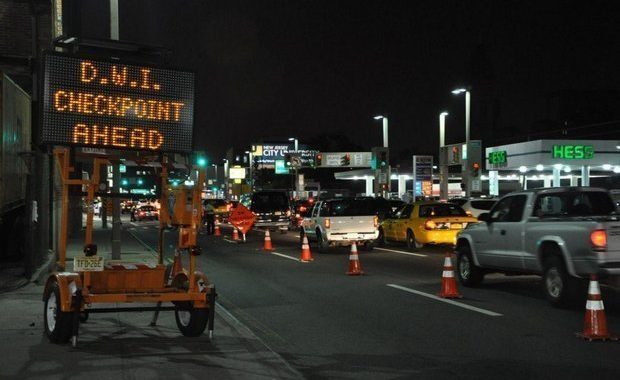Often DWI cases begin with a driver being stopped at what is referred to as a DWI Checkpoint. From the standpoint of defending a driver charged with Driving While Intoxicated and the Constitutional Rights of drivers, there are important issues arising from a Checkpoint stop that should be considered.
As a basic Constitutional principle, individuals acting on behalf of the State such as Police Officers and State Troopers, cannot stop motor vehicles unless they can justify the stop. Both the United States and New Jersey Constitutions require that the State demonstrate a reasonable and articulable suspicion that the law has been violated before an Officer can intrude upon the driver’s right to travel without State interference. Simply stated, the State has to make some showing that a law has been violated before a car can be stopped. If not, the State will be prevented from having evidence acquired as a result of that stop considered by the Court. In the case of a DWI prosecution, this would include evidence that the driver was operating a vehicle under the influence of alcohol. This evidence would be crucial to the State’s ability to prove the driver’s guilt.
Obviously, cars stopped at DWI checkpoints are not stopped because of a motor vehicle violation. Rather, they are stopped simply because a checkpoint has been mounted at a particular location, on a particular date and at a certain time. This would seem to be at odds with Constitutional requirements. The answer has been provided by United States and New Jersey Court decisions which have held that Checkpoints meet Constitutional standards if certain basic requirements are met.
Firstly, the checkpoint must be under control of a superior Officer who has organized the checkpoint so it meets Constitutional and safety standards. The United States Supreme Court determined some time ago that cars cannot be stopped without a prior plan being approved and put into effect by Superior Officers.
More important is the requirement that the Checkpoint must be placed at a location where intoxicated drivers are expected to pass through, based upon prior police experience. This in turn, must be based upon data which demonstrates occurrence of prior DWI arrests and accidents where intoxication is a factor, in the vicinity of the DWI checkpoint. In other words, the State must demonstrate a reasonable expectation that intoxicated drivers will pass through a certain location at a particular time, based upon data reflecting this experience.
Before an attorney can get to the question of whether the State can show a driver’s intoxication then, the attorney must consider whether the Checkpoint which led to the stop, justified the stop in the first place. This means demanding that the State produce all documentation which was created, leading to the Checkpoint in question, including data which the State relied upon in choosing the date, time and location. Obviously, this information must be carefully reviewed by the attorney to see if required standards have been met. If not, evidence of intoxication will be excluded from the case against the driver.

DWI Checkpoints
Posted in Articles and tagged Best DWI Lawyers, Breath Test Machine as Evidence, drug and alcohol, dwi, DWI courts, field sobriety testing, Lederman, Peter Lederman.